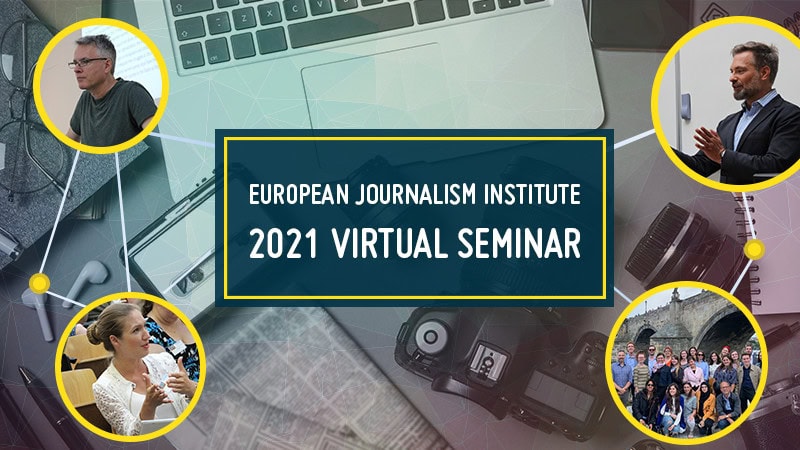
Though COVID-19 travel restrictions are still in place for many countries, The Fund for American Studies (TFAS) is continuing to offer its transformative international programs this year, including the European Journalism Institute 2021 Virtual Seminar.
Hosted in partnership with The Media Project, the program allowed student and professional journalists to learn about journalism and public policy issues while expanding their international networks.
Nearly 55 participants from 21 countries joined the three-day virtual conference this year to hear from journalists and professors around the world on “A Digital Exploration of Key Themes and New Trends in Journalism.” Touching on similar topics to the in-person program, the 2021 virtual seminar focused on entrepreneurship, storytelling and religion reporting.
ENTREPRENEURSHIP IN JOURNALISM
Panelists convened on July 6 for the first 1.5 hour session of the week on “Entrepreneurship in Journalism.” Moderated by Paul Glader ’99, ’00, co-founder and CEO of VettNews.com and former reporter for The Wall Street Journal, Associated Press and The Washington Post, the panel explored best practices for connecting with and instilling trust in readers while identifying key problems for journalism startups.
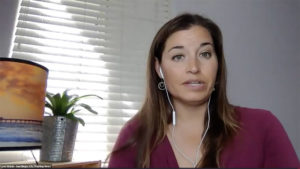
Assistant Director of Trusting News Lynn Walsh kicked off the discussion with insights on how people around the world are getting their news and which platforms instill the most trust in readers. Citing data from a recent Reuters report, Walsh shared that readers have indicated a strong preference for digital news platforms – especially through emerging mediums like TikTok and WhatsApp. While news outlets may be tempted to quickly shift to sharing coverage through these channels, Walsh believes it is important to maintain consistent ethical standards across the board.
“Ethics apply no matter the medium,” Walsh shared. “The same ethical standard you have for the lead story of your paper, your website or your six o’clock newscast should apply to all platforms.”
Senior Editor for Bloomberg News and Businessweek and returning professor David Rocks also shared what he believes is a key area for problems and solutions in journalism: telling real stories about real people. Based in Berlin, Rocks has learned over the years that the best way to connect with readers is focusing on the fundamental building blocks of effective journalism.
Erosion in trust in the media is a real threat to a healthy democracy. In today’s climate, there are too many sources of misinformation and deceit that pass off as news, with consequences on our democracy at the highest levels.” – European Journalism Institute 2021 Virtual Seminar Participant, Eric Persons ’94, ’97
“We’ve gone through a huge amount of change in journalism in the past 10 to 20 years, but in a lot of ways the real problems are the same as always: having good information, good sources, and good storytelling,” Rocks said.
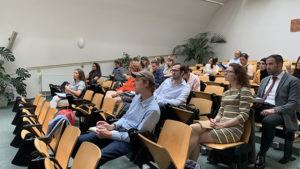
Participant Eric Persons ’94, ’97 said that the virtual seminar helped him realize the importance of trust in the media. Persons serves on the board of up-and-coming news organization Central Current, whose mission is to provide fact-based journalism and balanced opinion pieces on current events. Persons believes that honest journalism is essential to instilling trust in the public.
“Erosion in trust in the media is a real threat to a healthy democracy. In today’s climate, there are too many sources of misinformation and deceit that pass off as news, with consequences on our democracy at the highest levels,” Persons said. “Journalists must build strong relationships with the audiences they serve to regain that trust by engaging with communities that are underrepresented in the media, and being more responsive to the issues that are important to them.”
Rocks and Walsh were also joined by Dina Aboughazala ’05, ’08, founder of EGAB and former senior journalist for BBC, and Vishal Arora, founding member and editor of Newsreel Asia.
STORYTELLING IN JOURNALISM
On day two, participants heard from another panel of experts on “Storytelling in Journalism.” This session highlighted how different mediums can tell different stories and how to overcome storytelling challenges posed by occurrences like the COVID-19 pandemic.
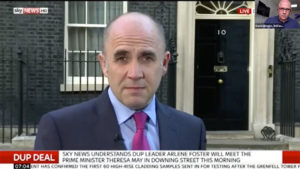
Senior Ireland Correspondent for Sky News David Blevins believes that the challenges associated with the COVID-19 pandemic have encouraged journalists to use technology for storytelling in groundbreaking ways.
“I think the global pandemic has presented us with an opportunity to review everything we do to ensure that we emerge into this new world with journalism in better shape than it’s ever been in before,” Blevins said. “If COVID-19 has illustrated anything, it is that the new technology available today creates the potential for this to be the golden era of journalism.”
Suzanne Kianpour ’09 agreed that the challenges associated with the COVID-19 pandemic have encouraged creativity in journalism.
“The pandemic, when it comes to storytelling in particular, made us think differently and get creative,” Kianpour said.
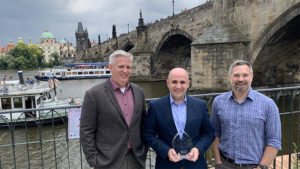
The BBC foreign affairs and political reporter credits this new era of technology with the start of her podcast, The Inquiry. Kianpour believes that audio storytelling, like podcasting, has the ability to connect with people in a completely different way than the traditional news article or broadcast interview.
“I think we’re seeing a resurgence of audio storytelling. Audio is so intimate and I think the pandemic heightened that,” Kianpour shared. “I found that during the pandemic, more people were more willing and more vulnerable and open in telling me their deepest thoughts and feelings. There really is something about not seeing the story, and listening to it and really feeling it.”
The panel was moderated by Melissa Harrison, NBC news reporter, senior programs manager at The Media Project and professor at Texas Christian University. Getty Images Chief News Photographer Sean Gallup and Reason Magazine Managing Editor Stephanie Slade, Novak ’16, also joined the conversation.
REPORTING ON RELIGION
In the third and final session of the seminar, participants heard from panelists on reporting on religion during pandemics, the challenges associated with reporting on several different religions, and understanding the role of religion in people’s everyday lives.
Moderated by TFAS Director of Journalism + Communications and U.S. Programs Joseph Starrs, the July 8 panel included TFAS professor Ibrahim Al-Marashi ’01, Megan Clark of Religion Unplugged, and Julie Asher of Catholic News Service.
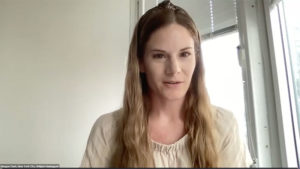
Clark said she most appreciates the intersection of religion with other cultural issues in the world. The New York City based reporter has found that a person’s ideological perspective and worldview are oftentimes linked to their religion.
“Reporting on religion involves understanding what motivates and drives people of faith, and for me that’s the most interesting part,” Clark shared. “It’s about getting behind a lot of the facts and understanding people’s world views and how their beliefs are shaping these ideologies that we see. Basically with every cultural issue that makes it on the front page of our newspapers, there is a religious component to it.”
TFAS International programs offer students and young professionals around the world the opportunity to learn about individual freedom and free markets while exploring new cultures and expanding their global networks. Typically hosted in Prague, the European Journalism Institute encourages participants to expand their understanding of religion in public life, explore fundamental issues related to journalism ethics, and consider the importance of independent, fact-based journalism as a foundation of liberty and free societies.
To learn more about TFAS International programs, visit TFASInternational.org.

